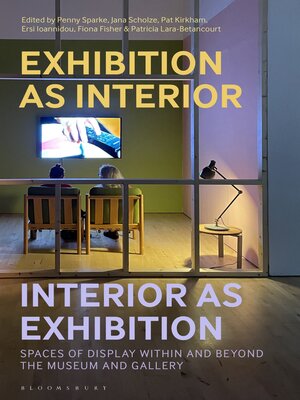Exhibition as Interior, Interior as Exhibition
ebook ∣ Spaces of Display within and beyond the Museum and Gallery
By Penny Sparke

Sign up to save your library
With an OverDrive account, you can save your favorite libraries for at-a-glance information about availability. Find out more about OverDrive accounts.
Find this title in Libby, the library reading app by OverDrive.



Search for a digital library with this title
Title found at these libraries:
| Library Name | Distance |
|---|---|
| Loading... |
Exhibition design has long been studied in the fields of art, design and architecture, but the focus has been on the design of the exhibition narrative, rather than the design as interior space. This book breaks new ground, exploring the complex relationships which exist between exhibitions, museums and galleries and interior design.
Taking a case-study-driven approach, chapters explore a wealth of spaces; looking at contemporary art galleries and globally-renowned museums, and also subverted spaces like squatted homes, high-rises, distilleries and laboratories. Their geographic coverage ranges from socialist Eastern Europe to the US, stopping via many other countries such as Germany, Croatia, Australia and the UK.
These case studies rethink how exhibitions interact with their spatial surroundings, with key themes including the role of labour in creating these spaces, the dualism of public and private space, the impact of exhibition audiences and reception, the political implications of exhibitions and the influence of institutions.
With an interdisciplinary range of contributors, and combining a historical and contemporary outlook, this is a must-read for anyone designing or curating design-driven museum spaces.
Taking a case-study-driven approach, chapters explore a wealth of spaces; looking at contemporary art galleries and globally-renowned museums, and also subverted spaces like squatted homes, high-rises, distilleries and laboratories. Their geographic coverage ranges from socialist Eastern Europe to the US, stopping via many other countries such as Germany, Croatia, Australia and the UK.
These case studies rethink how exhibitions interact with their spatial surroundings, with key themes including the role of labour in creating these spaces, the dualism of public and private space, the impact of exhibition audiences and reception, the political implications of exhibitions and the influence of institutions.
With an interdisciplinary range of contributors, and combining a historical and contemporary outlook, this is a must-read for anyone designing or curating design-driven museum spaces.







